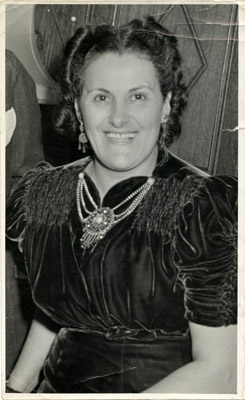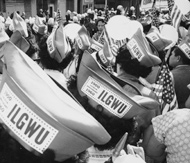

Highlights
Celebrate Women's History Month

Born Rachelle Peisoty on November 20, 1896, Rose Pesotta was the second oldest of ten children. Pesotta grew up in the Ukraine where her parents owned and operated a small shop, and the family lived comfortably in a Jewish orthodox household. Education was important, and Pesotta was proficient in four languages. From 1909 to 1912, she attended Rosalia Davidoff’s private girls’ school. While her father was a member of the Bund and self-proclaimed political activist, he forbade any revolutionary and radical discussions in the home out of fear of persecution, yet older sister Esther introduced Pesotta to radical political ideas. After being betrothed without her knowledge to a neighborhood boy, Pesotta decided she wanted to immigrate to the United States to join Esther and her husband. At the age of seventeen and after many struggles with her family, she was finally allowed to leave and Pesotta and her grandmother arrived in New York.
Pesotta stayed with Esther who was working in the needle trades. She soon joined her sister as a seamstress making shirtwaists, while teaching herself English. The conditions in the factories prompted Pesotta to join the Waistmakers Local 25 of the ILGWU in 1914. Pesotta was active early in the union, picketing, attending the union’s education classes, and taking trips to Unity House. In 1917 with employment scarce in the garment industry, Pesotta briefly trained to become a nurse. She resumed her work in a garment factory and became fully invested in the Russian Revolution. In 1920, she became a member of the executive board of Local 22 and was a dynamic spokesperson in her shop. Pesotta attended the Bryn Mawr Institute for women workers during the summer of 1922 and subsequently attended other labor colleges including the Brookwood Labor College and the Wisconsin Summer School, gaining writing, speaking, and negotiating skills.
In 1920, her father was killed during an anti-Semitic raid in his village and during this period she also suffered the loss of her fiancé, Theodore Kushnarev, when he was deported. Throughout the difficulties, Pesotta continued with her work for the ILGWU and began her career of anarchist writing and organizing. While in Boston for a union meeting in 1922, Pesotta became involved in the Sacco and Vanzetti case. Nicola Sacco and Bartolomeo Vanzetti were Italian immigrants active in the anarchist movement who were arrested and convicted of murder during an armed robbery in 1920. Pesotta met both Sacco and Vanzetti while they were in jail and continued to correspond and visit them until the end. She was sympathetic to their plight and volunteered at the defense offices and attended court proceedings.
By September 1933, Pesotta was now a paid staff member of the union and was sent to Los Angeles to organize dressmakers. Her exceptional work on the west coast and the advancements made through her organizing efforts led to her election of vice president of the ILGWU in 1934. She traveled to cities across the country to help with organizing efforts and strikes, and Pesotta became involved with the UAW during the Flint Sit-Down Strike in 1937. In 1942 after some disagreements and opposition with a difficult to organize shop in Los Angeles, and tensions with the board and David Dubinsky, Pesotta resigned and resumed sewing in a New York dress shop. At the 25th convention in 1944, Pesotta resigned as vice president on the executive board of the ILGWU.
It was when Pesotta returned to work as a sewing machine operator that she began to write her autobiography, “Bread Upon the Waters,” published in 1945. Though not endorsed by the ILGWU, the book was successful and had multiple printings and was translated into different languages. Her new found fame led to new opportunities, including a job with the Anti-Defamation League. In 1946, Pesotta participated at a summer school for the Workers Education Association in Norway at the invitation of the secretary of the Norwegian Labor Party. During the trip, she also traveled to Sweden and Poland and was deeply affected by the conditions of post-war Poland. She soon resigned from the ADL and in January 1949, began a position with the American Trade Union Council for the Histadrut as Midwest regional director. In between the various jobs or travels, Pesotta always returned to working in the garment industry. During her time in the factories, she continued to write manuscripts, including the 1957 self-published “Days of Our Lives” about her childhood in Russia. Pesotta died on December 4, 1965.
Read more about Rose Pesotta in the archives: 6036/027, 5928


